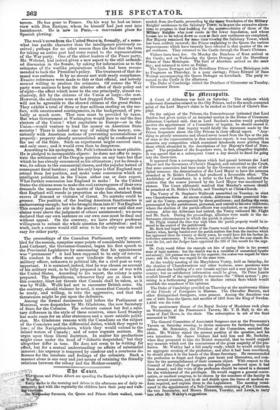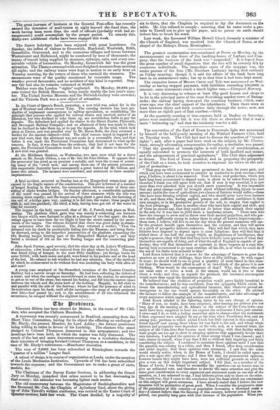Ibe jilittropolts.
A Court of Aldermen was held on Saturday. The subjects which underwent discussion related to the City Prisons, and to the much-contested point of the Lord Mayor's claim to be ranked as the head of Christ's Hos- pital. On the subject of the Prisons, the Remembrancer intimated that Lord Sandon had given notice of an intended motion in the House of Commons.
Alderman Copeland said, that as Lord Sandon's motion would probably involve the appointment of a Committee of inquiry, he should second it. He was convinced that inquiry would falsify the statement made by the Prison Inspectors about the City Prisons in their official report. " Any- thing so grossly erroneous and absurd never issued from the lips or the pen of man as the representation in that notorious report: it was impossible to
conceive any composition which contained falsehoods more glaring than those which abounded in the descriptions of her Majesty's Gaol of New- gate." The prejudices of the Inspectors were, in fact, altogether frightful It was agreed that at a subsequent Court a day should be fixed for going into the discussion.
It appeared from a correspondence which had passed between the Lord Mayor and the Governors of Christ's Hospital, and submitted to the emit, that some concession had been made by the Governors on the point of the
Spital sermons: the determination of the Lord Mayor to have the sermons preached at St. Bride's Church had produced a favourable effect. The Archbishop of Canterbury, in a letter to the Lord Mayor, indicated the opinion that the course pursued by the Lord Mayor was sanctioned by custom. The Court ultimately resolved that Monday's sermon should be preached at St. Bride's Church, and Tuesday's at Christchurch.
The Vestry of St. Stephen's Walbrook assembled on Tuesday, to elect two Churchwardens. At eleven o'clock, Alderman Gibbs presented him- self at the Vestry, accompanied by three gentlemen; and finding the room preoccupied by the parishioners, protested, and retired to his own residence; where the election of the pariah-officers was conducted, as on previous oc-
casions. After the Alderman had retired, the Vestry reelected Mr. Flight and Mr. Rock. During the proceedings, allusions were made to the un- fortunate circumstances in which the parish is placed—
Mr. Flight trusted the time was nigh when the parish property would be re- stored to the control of the parishioners. Mr. Rock had hoped thedecision of the Courts would have been obtained before Easter; when, having handed over the parish matters free from the incubus which has oppressed them for twenty or thirty years, be would have felt his further in- terference unnecessary. It was, however, not yet settled; but the case stands No. 4 on the list, and the Judges have appointed the 22d of this month for the argn ment.
Dr. Croly would follow the example set him of saying little in the present state of legal matters: but the church was in a condition of unmatched squalor and misery; 110 guineas was due to the organist; the sexton was unpaid for three years; and Dr. Croly was unpaid for the same term.
At the weekly meeting of the Marylebone Vestry, held on Saturday, for the election of Churchwardens and other business, some questions were asked about the building of a new lunatic asylum and a new prison by the county; but no satisfactory information could be given. Sir Peter Laurie availed himself of the opportunity to denounce the " Silent system "; pro- mising in a forthcoming pamphlet to disclose certain facts which would establish the soundness of his opinions.
The Duke of Cambridge presided on Thursday at the anniversary dinner of the Friends of Foreigners in Distress. The Chevalier Bunsen, and
other distinguished foreigners, were present. Among the donations was one of 1001. from the Queen, and another of 1201 from the King of Sweden. 1,4541. was the total.
The anniversary dinner of the Royal Society of Musicians took place on Wednesday, at the Freemason's Tavern; Mr. T. H. Hall, in the ab- sence of Earl Howe, in the chair. The subscription in aid of the fund amounted to 7001.
The General Committee of Associated Surgeons met at the Freemason's Tavern on Saturday evening, to devise measures for furthering medical reform. Mr. Bottomley, the President of the Committee, occupied the chair. Mr. Wakley stated the present position of the question, and his own intentions. Sir James Graham had told him and Mr. Berkeley, when they presented to him the Bristol memorial, that he would support any measure which met the concurrence of the great majority of the pro- fession. Mr. Wakley had a bill nearly ready, which he would submit to an aggregate meeting of the profession; and after it had been considered, he should place it in the bands of the Home Secretary. He recommended the profession to forget and forgive past heats and dissensions, and com- bine for the accomplishment of their common object. With respect to the Council of the College of Surgeons, the privileges conferred upon it had been abused; and the voice of the profession should be raised in a demand for the withdrawal of the privileges. He would suggest a general convo- cation, or medical congress, to be chosen by the members of the faculty in their several counties, and to sit and decide upon the items of medical re- form required, and explain them to the Legislature. The meeting termi- nated in the appointment of a Sub-Committee, consisting of the Chairman, the two Secretaries, and Messrs. Bloxam, Yearsley, and Lewis, to carry into effect Mr. Wakley's suggestions. The great increase of business at the General Post-office has recently tamed the detention of mail-trains at night beyond the fixed time, the work having been more than the staff of officers (probably with bad ar- rangements) could accomplish by the proper period. To remedy this, thirty-two additional clerks have been engaged this week.
The Easter holydays have been enjoyed with great heartiness. On Sunday, the influx of visiters to Greenwich, Blackwell, Woolwich, Erith, Greenhithe, Gravesend, and to the numerous villages and towns between Westminster and Richmond, might be numbered by tens of thousands; the means of transit being supplied by steamers, railways, cabs, and every con- ceivable vehicle of locomotion. On Monday, Greenwich fair was the great attraction. The Thames swarmed with over-freighted steamers from morning till night; and the railway trains were kept in motion to an early hour on Tuesday morning, for the return of those who outstaid the steamers. The amusements were of the quality sanctioned by venerable usage. The weather proved favourable, and no accident of any kind is reported. Step- ney fair had also its votaries, estimated' at 30,000. Neither were the London " sights" neglected. On Monday, 29,896 per- sons visited the British Museum, being nearly double the last year's num- ber. The United Service Museum and the Dulwich Gallery were crowded; and the Victoria Park was a new object of attraction.
In the Court of Queen's Bench, yesterday, a new trial was asked for in the case of Woohner and others versus Toby. The existing decision has been pro- ductive of unpleasant consequences to railway speculators, as establishing the ' principle that persons who applied for railway shares and received notice of an allotment, but who declined to take them up, are nevertheless liable to pay the deposits. The defendant had applied for shares in the Direct Exeter, Plymouth, and Devonport Railway Company; and an allotment, of forty was made to him; but he declined to take them up, or to pay the deposits. At the trial, which took place at Exeter, and was presided over by Mr. Baron Rolfe, the Jury returned a verdict for the amount claimed-1051. The chief reasons urged in support of a new trial were, that the allotment was not made in a reasonable time, and that before it was made the Provisional Committee had determined to wind up the concern. In fact, it was clear from the evidence, that bad it not been for the panic, the Provisional Committee would have kept all the shares to themselves. A new trial was granted.
At the Middlesex Sessions, on Wednesday, two men were tried for a fierce assault on Mr. Joseph Gibbon, a son of th3 late Sir John Gibbon. It appears that the prosecutor has acted as an amateur e instable, and been the means of arrest- ing many of the "swell mob," and among them one of the present prisoners: this respectable fraternity have consequently a great hatred far Mr. Gibbon, and hence this attack. The accused were convicted, and sentenced to three months' imprisonment.
A fatal accident occurred on Sunday last at the Hungerford steam-boat pier, caused by the fragile nature of the construction. This pier is formed of a number of barges floating in the water, the communication between some of them con- sisting of slight wooden bridges. On Sunday afternoon, a considerable agitation of the water was caused by the arrival of three steamers while the tide was running down rapidly; and the barges swaying about a good deal, the fastening of one end of a bridge .gave way, causing it to fall into the water; three people fell with it, and two perishedt' the third, a lady, having been got out of the water in time for recovery. The inquest on the body recovered, that of Mr. J. Powell, took place on Wed- nesday. The platform which gave way was merely a connecting one between two barges which were fastened to piles at a distance of two feet apart: the fast- enings appear to have been far too slight to bear the strain caused by the move- ments of the barges. One witness declared that there was great delay in obtain- ing assistance after the accident. The Jury returned a verdict, "That the deceased met his death by accidentally fellinginto the Thames; and being there- by drowned, owing to the imperfect construction of the platform connecting the two floating barges forming part of the Hungerford Market-pier"; and they levied a deodand of 501. on the two floating barges and the connecting plat- form.
John Jacob Farmer, aged seventy, died the other day at St. Luke's Workhouse, of exhaustion, a few hours after removal from the place where he lived. The man was found dying of hunger, in the most filthy condition: yet foreign bonds for some 9,0001., with bank-notes and gold, were found in his pockets and at the head of the bed. He refused to tell whether he had any relations. One of the methods by which he endeavoured to do without food was anointing his body with olive oil and soot I A young man employed at the Shoreditch terminus of the Eastern Counties Railway had a narrow escape on Saturday. He had been collecting the tickets of a train; and when the camages moved forward to enter the station, he attempted to get on to one of the steps; but missed his footing, and fell into the narrow space between the wheels and the stone kerb of the footway. Happily, he fell close to and parallel with the side of the footway; where he had the presence of mind to lie motionless upon his back, until all the carriages—the steps of which projected over him—had passed by; and, to the astonishment of all who witnessed the ce occurren, he escaped without the slightest injury.



























 Previous page
Previous page